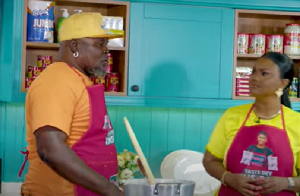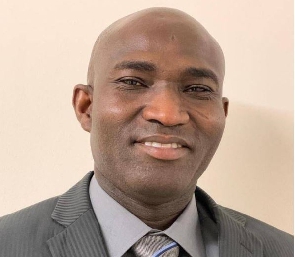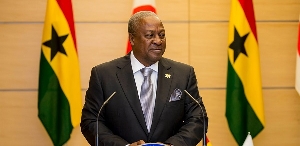Globalizing Without The Common Man: The Sad case of policy making in Ghana
When the Black Stars of Ghana lost their opening game to Italy in their first ever World Cup appearance, it was reported someone lost her life as a result. Nobody asked what the course was. We all assumed it was the shock. When the same team beat the US and qualified to the next round of the competition, another person lost the life as a result. Nobody asked what the course was. Most of us assumed it was the excitement. But on this occasion I assumed otherwise. I assumed it was hunger because I also nearly collapsed from the excitement mixed with hunger! Informal sources tell me the autopsy report shows the man died of hunger. So I it means I was right. Unlike most other guesses one gets right, I am humbled by this reality. It is a shame!I bet he was not the only one. Many have died of hunger related diseases and issues which have not been reported. There are many more important things around us which we assume away but which have a deterministic bearing on who lives and who dies. One such thing is the lesser known policy environment we live in. Polices are negotiated all the time for the people who are denied a hearing by the same policy negotiators and makers. The proposed Economic Partnership Agreement (EPA) with the EU is one such policy that largely disregards the interests of the masses.
Since the proposal for a Free Trade Area (FTA) through the supposed Economic Partnership Agreement (EPA) between the European Union (EU) and the African Caribbean and Pacific (ACP) countries was made, discerning individuals and civil society organizations did not take time to fish out the greed and the inequity that is going to be perpetuated by such a system. In an effort to throw dust into the eyes of little minds, and minds that were asleep, the whole process was arbitrarily branded as one for the development of the ACP states. From a cursory look however, one did not have to be Einstein to see that everything about the agreement told a story that could be everything but the development of the ACP states.
The danger of unbridled competition from European firms in the face of the high subsidies they enjoy, the disastrous impact on ACP governments’ tariff revenues in the absence of alternative sources of revenue, the burdensome adjustment costs to the ACP and the wanton disregard of the African perspective of regional integration are but a few of the potent reasons espoused by critics of the EPA. Many have joined the trail in condemning an FTA with the EU in the terms the EPA is defined. The marginalized, the vulnerable groups and the common man in the machining of the state and the economy who in one way or the other are going to be adversely affected by such an arrangement have cried out loud and strong against any EPAs with the EU. Probably they did not shout loud enough or there were no ears to hear; but you can trust the European machinery to work and work more efficiently!
Policy makers in the ACP especially Ghana as if by design saw the activities of civil society as being competitive and counter developmental instead of being seen as complementary to the policy-making and development process as a whole. It is not uncommon to hear arguments in policy circles that “if you think the EPAs are bad, what is your alternative? Can’t we just concentrate on the little good that it brings and get the benefit from that?” These two common questions usually pull up two common puzzles anytime they are raised. Firstly, for all I know, one does not have to be wearing a beautiful shirt to be able to state that another’s shirt is dirty. And if one says another’s shirt is dirty, it does not mean one has or should have a shirt for another. It may just be to draw another’s attention to a fact that one did not notice and one may be better off walking without a shirt. On the second question, one will ask why the country should even opt for something that it knows is bad in the first place and try to minimize the bads when it probably could opt for a better choice. A better choice can be a no choice or a refusal to choose.
Truths they say will remain truths and falsehood in its characteristic nature will continue to change its face. It is however always a great relief and really very refreshing when the truth finds weight to displace falsehood and becomes more and more abundant. Such is the feeling as studies are abundantly confirming the fears of civil society on the EPAs with the EU. This can well pass for a feeling of vindication in a competitive environment but it is not. It is a feeling of collective understanding and realization. Any contrary feeling will be suicidal to the whole process of development. The validation of civil society position by the empirical studies should mark the beginning of a real partnership in development especially on the EPAs negotiations. That is the passport to participation in policy making process.
In Ghana, a series of studies have not rated the EPAs as development-friendly in their current form. In a validation workshop of one of these studies that sought to assess the impact effects for Ghana of an EPA with the EU, the conclusions are generally not different from the espoused dangers of the EPAs by the commoner on the street. Among other things, the study indicated that there has been very little diversification in trade and the products traded between and with the EU and the country over the past 30 years. Because of this, and the high concentration of trade between the country and the EU, an EPA with the EU will have the potential effect of destabilizing the Ghanaian economy. (My grandmother would have said oooh! paaaati! to this)
This conclusion is founded on the economic intuition that with little product diversification and with a single dominant trading partner, there are no or very limited substituting sectors that can absorb the shock that will come from liberalizing trade with that dominant partner – the EU. According to the research team led by Prof Cletus Dordunoo, in terms of policy prescription, it means that the country has not reformed its production lines over the years and this could be because of the restrictions both internal and external that tailored the production structure to be rigid.
The study was also loud in pronouncing that an EPA with the EU will lead to an influx of value added and manufactured imports into the country of over 100 million US dollars a year thus potentially displacing local fledging industries that produce the imported goods. The implications for employment and poverty need no mention in this article because if you can read this article, then you can more than imagine the effects. This goes to confirm the unbridled competition argument that has from the beginning been raised by common men but flagged by men in power as been untenable.
On the expected revenue loss, the study couldn’t have been more supporting of the position taken by civil society. With the coming into effect of a full EPA with the EU, the country will be losing some 1.8 trillion Cedis (about 200 million US dollars) on customs revenue alone. Revenue from the manufacturing sector will be lost to the tune of 93%. The net welfare effect was estimated to be a loss of over one trillion Cedis (over 110 million US dollars) and many other mind blowing outcomes.
It therefore beats the imagination of simple mortal man to understand why the EPAs should at all be negotiated if all that the country stands to gain is a devastation of its economic base. Probably, I am not the only simple mortal man because some others who probably did not hear the voices from afar have come to accept that the EPAs have the potential of jeopardizing the economy of Ghana. This observation was made by a veteran negotiator and representative of the country at the WTO and currently a Director of Trade at the Ministry of Trade and Industry.
The agreement that conceived and warranted the EPAs demanded that the EU provides an alternative which will not be worse than the current system of preferences under the previous regime (Lome accord) for countries like Ghana that have found that the EPAs will not help in their development. His dilemma was however with how to get an alternative that conforms with the WTO rules of reciprocity and non-discrimination which will at least maintain the preferences of the previous agreement for Ghana given that the outcome of the studies do not support an EPA for Ghana. He acknowledged that such an alternative was not humanly possible.
The difficulty of the Director is legitimate. The EU knew of this from the onset and it was very deliberate even though it was within the EU’s negotiation mandate to provide such an alternative. May be the Director did not know, but now it should have occasioned to him that the EU was never enthusiastic about an alternative and that what seemed so neat on paper does not stand up to the complex realities on the ground. The remarks by the EU trade Commissioner’s top trade official Peter Carl that “the UK could well make progress with the EPA negotiations more difficult by reinforcing the views of the more skeptical ACP states and raising the prospect of alternatives that are, in reality, impractical” should probably confirm that the EU did not mean it when it signed that there should be alternatives to be provided by it that still maintained at least the Lome preferences.
But whose headache should it be to find such an alternative? It is definitely not Ghana nor the ACP because it is not within their negotiation mandate. If there is any efficacy in the document signed, then the EU should find such an alternative. Probably all Ghana has to do is wait and assess the various alternatives that come up and say “yes” or “no”.
For me, thinking of an alternative under the circumstances should be the least of the country’s worries. In fact there are many more problems to busy the minds of leaders on than the EPA alternatives. If you did not believe there are many more problems than can be handled in Ghana, just take a look at our presidents. Rawlings grayed earlier than his age and Kuffour started graying just a month into presidency. As for Nkrumah, he did not have the privilege of growing the hair let alone gray them. He went straight to bald a year into presidency. I want to assume that it is the stress of the myriad of problems in the country that make our leaders take this new look shortly after assuming power.
You may now want to say hurray because some policy makers now appreciate the problems but I say hold it! It is good news when the deaf and dump gets a hearing sense but it is not so exciting because there is not much meaning to the words s/he hears. Getting such a sense marks the beginning of real work of re-education and re-orientation to be able to give value to such a blessing. (Luckily, we have a new ministry of national Orientation and it could make the process easier or what do you say?)
In Ghanaian parlance, it is said that “when you talk about a ‘spoilt’ child, you have to talk about the parents too”. The EU “no de force” because it is forcing something bitter down the throat of the country. Toy Blair at least has recognized this. In spite of these startling revelations, one observes with nostalgia the commitment and dutifulness with which the country is going along the negotiations without doing anything to address the looming dangers as we approach the commencement of the EPAs in January 2008 – a month to the start of another football tournament – I hope we do not have more hunger related deaths. The country plans as if nothing is at stake. If this was done without continually signing unto the EPA negotiation processes, one would have thought it is an indication that the EPAs will not come into effect. But this is not the case. We are leaping before we look.
The Economic Reform Programme of the 1980s is a classic case of a “leap before you look” policy reform as it embarked on a liberalisation agenda without recourse to the impact of such reforms on society and the economy. It is no wonder that this policy later proved to be a case of an over liberalization and thus the need to initiate a Programme of Action to Mitigate the Social Cost of Adjustment (PAMSCAD). Why should we create the costs first before initiating an action to mitigate against these costs? One does not have to go far in thought to figure that if things continue with the EPAs as we have now, the same mistakes of the 80s are going to be repeated in even a grander style and proportion and one wonders whether a ‘PAMSCAD’ can rescue the economy this time round.
The halfhearted attitude of policy makers in these negotiations to either forestall the negative effects or to stop the whole process is further demonstrated by the non-inclusion of the projected effects of the EPAs on important national development and planning documents that go into the EPA year of commencement. For instance, in the 2006 government budget which made projections into 2008, there is nothing that indicates that the EPAs will have an effect on government revenue even though you and I know that it will impact adversely on revenue. Probably it was forgotten but that will go to confirm that the EPAs are not taken serious. The same can be said of the Ghana Poverty Reduction Strategy (GPRS) which runs into 2009 without any factoring of the effects of an EPA in the whole plan.
These observations do not in the least suggest that the country takes the effects of the EPAs seriously. Without this recognition, one wonders the kind of negotiation that will take place. Sadly, the two main development policy documents outlined above: the National Budget and the GPRS II have always been developed in close collaboration with supposed development partners like the World Bank and the IMF. I do not want to believe that these omissions were deliberate in order to blind policy makers and get the country to fast track the EPAs and expand its liberalisation. The last time I said the World Bank masterminds the Budget and other development plans in the country, I was told by the Bank’s country office that the “Bank does not develop the documents for Ghana. It only approves”. For me, there is no difference because the Bank will only approve what it likes or would have done.
Perhaps this is the time for our policy makers to learn to listen to others even the dull and the ignorant for they too have their story and will appreciate a policy audience. The biggest and most responsible development partners that Ghana has had over the years are the very people who need to be developed. It is the citizenry. When the SAPs failed to yield the promised benefits, it was not the development partners who suffered. The ordinary Ghanaian was the sufferer for it. The loans that came with the failed policies still held. All those things helped qualify Ghana for a firmer grip of these multilateral institutions under the HIPC initiative as the country desperately needed support in its debt servicing. Globalization has its goods and bads. All you have to know is not to forget the people you are globing with. In the words of Professor Dordunoo, “if we fail to localize our globalization and choose otherwise, we would have frantically succeeded to fail”.






















